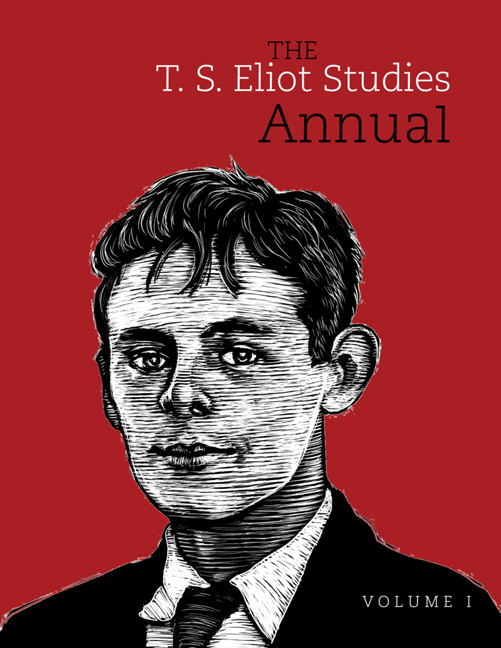Book contents
- Frontmatter
- Contents
- Abbreviations of Works
- General Editor's Note
- The Short and Surprisingly Private Life of King Bolo: Eliot's Bawdy Poems and Their Audiences
- Dull Tom-Tom's Absurd Prelude: Ludic Modernism in Early T. S. Eliot
- Eliot at Bergson's Lectures, 1910–1911
- The American Legacy of “Prufrock”
- Poetry (June 1915)
- The Stale Dregs of Revolt
- Prufrock, Belated
- Eliot's Allusive Legacy and Obscurity in “Prufrock”
- Transmuting F. H. Bradley: T. S. Eliot's Notes Towards a Theory of Poetry
- T. S. Eliot, Phenomenologist
- Astride the Dark Horse: T. S. Eliot and the Lloyds Bank Intelligence Department
- Aristophanic Structures in Sweeney Agonistes, “The Hollow Men,” and Murder in the Cathedral
- Eliot and Virgil in Love and War
- T. S. Eliot Bibliography 2014
- Notes on Contributors
The Stale Dregs of Revolt
- Frontmatter
- Contents
- Abbreviations of Works
- General Editor's Note
- The Short and Surprisingly Private Life of King Bolo: Eliot's Bawdy Poems and Their Audiences
- Dull Tom-Tom's Absurd Prelude: Ludic Modernism in Early T. S. Eliot
- Eliot at Bergson's Lectures, 1910–1911
- The American Legacy of “Prufrock”
- Poetry (June 1915)
- The Stale Dregs of Revolt
- Prufrock, Belated
- Eliot's Allusive Legacy and Obscurity in “Prufrock”
- Transmuting F. H. Bradley: T. S. Eliot's Notes Towards a Theory of Poetry
- T. S. Eliot, Phenomenologist
- Astride the Dark Horse: T. S. Eliot and the Lloyds Bank Intelligence Department
- Aristophanic Structures in Sweeney Agonistes, “The Hollow Men,” and Murder in the Cathedral
- Eliot and Virgil in Love and War
- T. S. Eliot Bibliography 2014
- Notes on Contributors
Summary
Shortly after receiving the June 1915 issue of Poetry magazine, Louis Untermeyer wrote to Harriet Monroe, in a letter she did not publish, to complain about Eliot's poem:
I confess that his “Love Song” is the first piece of the English language that utterly stumped me. As a post-impression, the effect was that of the Muse in a psychopathic ward—drinking the stale dregs of revolt.
The first piece of criticism to arrive from readers of “Prufrock” already registered the cognitive dissonance that persists in our assessments of this poem, one hundred years out. It is part of the lore of modernism that it “stumped” its readers, that seeing it caused Pound to exclaim, “Eliot has actually trained himself AND modernized himself ON HIS OWN.” Our understanding of “Prufrock” as a literary revolt continues, for example, in Christopher Ricks's contribution to this forum, first given as a lecture under the title “The Muse in the Psychopathic Ward.” Examining the contents of the June 1915 issue of Poetry, Ricks points out the many ways that Eliot's poem diverged from the other contributions. Untermeyer's phrase “muse in the psychopathic ward” implies that a kind of divine or demonic creative frenzy must have been necessary to produce a work so far from the beaten path. Indeed the theme of strangeness and altered consciousness (as in Arthur Waugh's account of Eliot as a “drunken slave”) runs through the contemporary reviews.
Yet Eliot's poem is not simply a “revolt” for Untermeyer; it is the “stale dregs” thereof, a “post impression.” William Carlos Williams famously called it “rehash and repetition,” complaining: “Eliot is a subtle conformist… . [“Prufrock”] is the latest touch from the literary cuisine, it adds to the pleasant outlook from the club window. If to do this, if to be a Whistler at best, in the art of poetry, is to reach the height of poetic expression, then Ezra and Eliot have approached it and tant pis for the rest of us.” Marianne Moore also compares Prufrock and Other Observations to Whistler's studies, and Babette Deutsch titled her review “Another Impressionist.” A decade after Whistler's death and in the aftermath of the First Post-Impressionist Exhibition of 1910 and the Armory Show of 1913, Impressionism was hardly avant-garde.
- Type
- Chapter
- Information
- The T. S. Eliot Studies Annual , pp. 85 - 88Publisher: Liverpool University PressPrint publication year: 2017



